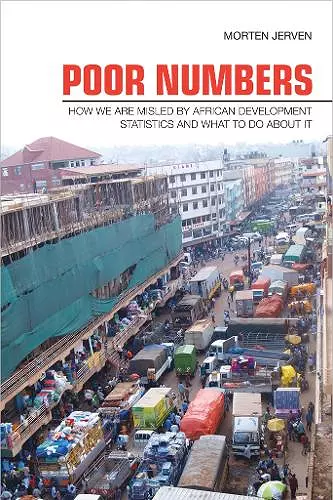Poor Numbers
How We Are Misled by African Development Statistics and What to Do about It
Format:Paperback
Publisher:Cornell University Press
Published:24th Jan '13
Should be back in stock very soon

One of the most urgent challenges in African economic development is to devise a strategy for improving statistical capacity. Reliable statistics, including estimates of economic growth rates and per-capita income, are basic to the operation of governments in developing countries and vital to nongovernmental organizations and other entities that provide financial aid to them. Rich countries and international financial institutions such as the World Bank allocate their development resources on the basis of such data. The paucity of accurate statistics is not merely a technical problem; it has a massive impact on the welfare of citizens in developing countries.Where do these statistics originate? How accurate are they? Poor Numbers is the first analysis of the production and use of African economic development statistics. Morten Jerven's research shows how the statistical capacities of sub-Saharan African economies have fallen into disarray. The numbers substantially misstate the actual state of affairs. As a result, scarce resources are misapplied. Development policy does not deliver the benefits expected. Policymakers' attempts to improve the lot of the citizenry are frustrated. Donors have no accurate sense of the impact of the aid they supply. Jerven's findings from sub-Saharan Africa have far-reaching implications for aid and development policy. As Jerven notes, the current catchphrase in the development community is "evidence-based policy," and scholars are applying increasingly sophisticated econometric methods—but no statistical techniques can substitute for partial and unreliable data.
[Poor Numbers]is a useful reminder of the dubious information content of economic indicators generated by national accounting systems of sub-Saharan African states. I recommend the book to all scholars and researchers who contemplate the use of data generated by national accounting systems of sub-Saharan African countries.
* Quarterly Journal of International Agriculture *Poor Numbers is a powerful little book..., highlighting the risks of making political inferences solely based on statistical analysis...Although an economist by training, Jerven's clear prose without jargon helps make Poor Numbers reach a wider readership. It is imperative to note that his is not a simple criticism of quantitative methodology, but of the confidence one has in the findings of quantitative analysis without due attention to the quality of the data. In this sense, even those who have no scholarly interest in African development economics would find the findings and conclusions pertinent to the foundational debates on the role of methodology and theory in political science.
* European Political Science *"Increasingly, scientists turn to the large statistical databases of international bodies when testing favoured hypotheses to control for growth and economic development. They might hesitate after reading Poor Numbers.... This book offers fascinating, disturbing insights for anyone interested in the role of numbers in the social sciences. For those using global economic databases, it should be required reading."
* Nature *This important book attempts to systematize what most quantitative practitioners in Africa generally understand: African macroeconomic data are poor.... Using a variety of sources that include current surveys of in-country statistical collection agencies and firsthand historical accounts, Jerven outlines several root causes of the data problem, which include Africa's colonial heritage and the more recent, structural adjustment policies. He continues his analysis by exploring how data are consciously shaped by both local and international politics and international aid agencies. Specifically, Jerven is critical of World Bank transparency and its unwillingness to provide him with quantitative methodologies of its official data compilation.... This volume opens up a venue for a research paradigm that could lead to much-needed improvements in the collection of African data. Summing Up: Highly recommended.
* Choice *The book is remarkable given that it is largely the result of the efforts of a single individual gaining access to NSOs.... Highly recommended to all those interested in the SSA region and in the measurement of economic activity in developing countries. Its publication has already started a much-needed lively discussion, which is a precondition for improving the quality of macro-economic statistics.
* The Africa Policy Journal at the Harvard Kennedy Scho- Winner of 2013 Foreign Affairs Magazine Best Book of the Yea.
ISBN: 9780801478604
Dimensions: 229mm x 152mm x 16mm
Weight: 454g
208 pages